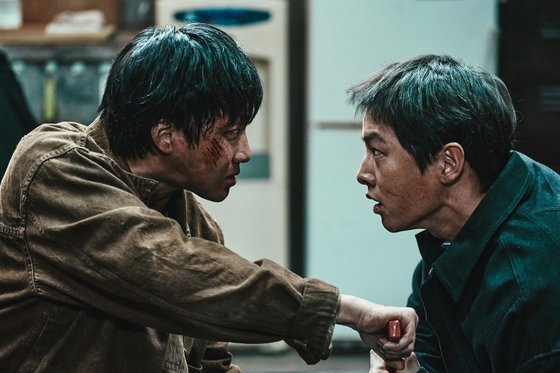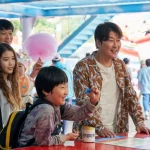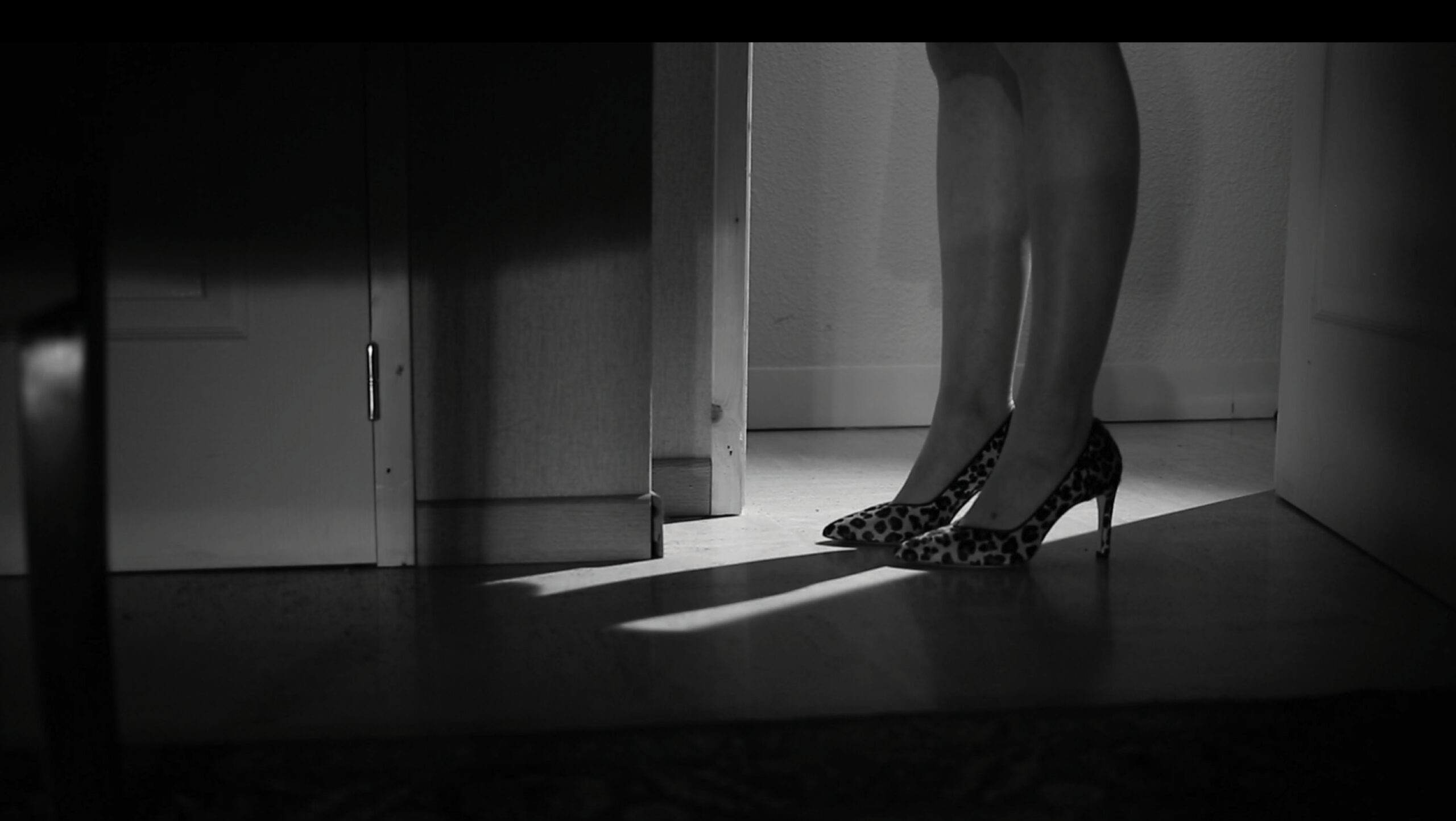London East Asia Film Festival 2023 returns to London with a diverse programme from East and Southeast Asia, including international and UK premieres.
Yiwen Hu review Hopeless, a dark thriller about the cyclical nature of violence and trauma
As the first film directed by the Korean Director Kim Chang-hoon, Hopeless was incredibly impressive when it premiered at the 2023 Cannes Film Festival and entered the competition genre at the London East Asia Film Festival. This neo-noir thriller successfully overwhelms the audience in its world full of violence and despair resulting from distorted familial relationships, and leaves the audience traumatised in the vicarious feeling of hopelessness through the characters just as the title suggests. This review will focus on the two main characters, Chi-geon played by Song Joong-ki and Yeon-gyoo played by Hong Xa-bin.
When the medium-statured, melancholic Chi-geon appears on screen together with other tanned, muscular gang members who are walking personifications of the word ‘violence’, I thought actor Song Joong-ki has too much of a perceived softness to be a Chi-geon who is the middle boss in the local gang. However, as the plot progresses, his fragile beauty enunciates the duality in the violent character he plays : Chi-geon is a gentle, empathetic big brother figure who cooks Yeon-gyoo fish and tells him the most beautiful, heart-wrenching story in the movie; but he also peels Yeon-gyoo’s and his own nails without blinking when Yeon-gyoo violates the principles of the gang to save a taxi driver’s life. As a mature gang member who enforces violence with no hesitation, he is not without pity for the victims. While persecuting the victims, he also injures himself physically as a form of self-punishment, yet we do not know whether it is for his mercy or for his cruelty.
Chi-geon is also more pessimistic about the future than Yeon-gyoo. Both characters have a box representing the core of their characters: Yeon-gyoo’s box includes colourful postcards from the Netherlands where he pictures a utopia with no violence or oppression of the powerless, as well as the money that he saved for his planned escape. It suggests his hope for the future that he clings on to. However, Chi-geon holds a pessimistic attitude towards escaping as he tells Yeon-gyoo that there is no such utopian place in the world, negating any possibility of that aforementioned hope . What remains in Chi-geon’s box are two rusted hooks, suggesting a jaded past related to his childhood trauma that he could never let go.
Chi-geon’s childhood trauma is implied by his tale in which he tells Yeon-gyoo of a boy who drowned in the sea while catching fish for his father. His body is hooked by a fisherman, and he comes back as a revenant, desperately crying and asking his father: ‘why didn’t you save me?’ Yet the careless dad was completely unaware of his son’s misfortune, reacting with: ‘Huh? Where have you been?’ Despite the element of magic-realism which makes this story feel almost fictional, the prototype for the boy is very likely to be Chi-geon himself as evident in the scar on his right ear which corresponds to the boy who is hooked by the ear by the fisherman. Chi-geon’s father relies on his son who brings the gang members to his restaurant to make a living, mirroring the father in the tale who makes use of his son for monetary purposes.
Here, the traditional parent-child relationship is completely reversed as the child becomes the breadwinner because the parent indulges themselves in their own miseries and uses alcohol to numb their feelings, therefore leaving the responsibility on the child.The father completely neglects the danger that the child is facing while working because he only cares about the result — money. Negligence is the distorted familial relationship that Chi-geon experiences during his childhood. This failure in communication leads to a constant suppression of his verbal expression because he knows that he could never get the response he wants from his father. He is always smoking silently with a bleak expression that is hard to read, and the only time when he almost shares his childhood story, he disguises it as a tale to deliberately make it unbelievable and thus distancing himself from the story because he is incapable of direct self-expression.
Yeon-gyoo is also traumatised by his familial relationship resulting from a failure in communication, and such failure in his case is marked by violence. The traditional idea of home as a haven of safety and love is completely distorted as Yeon-gyoo’s living space is penetrated by fear. Whenever he is about to relax himself at home, for example to eat or to sleep, his abusive step-father appears and all intradiegetic sounds are muted except for the noises made by the father: the slow, heavy steps approaching his bed, the sound of a baseball bat being dragged on the floor, and the flushing of the toilet signalling the imminent appearance of an abuser next door that composes a nightmarish symphony of domestic violence for Yeon-gyoo.
Even the mode of communication between the children is marked by violence, as Yeon-gyoo and his stepsister Hayan constantly fight verbally by using abusive swear words to address each other,often squabbling despite their love and protection for each other. However, such violence can also be considered as a physical mode of communication, and a mutual understanding is achieved between the children because they understand the heavily encoded language of violence. Therefore, in the end, they escape from the town together on the motorcycle which represents the mobility of youth and the ability to forgive the past and move on to the future.
As the director said, Chi-geon and Yeon-gyoo are designed to represent different time periods of the same person. Chi-geon is the past while Yeon-gyoo is the future, and their fate intertwines in the present. When Chi-geon stops Yeon-gyoo from chopping off his hand and thus from becoming as accustomed to violence as himself, he is also stopping the cycle of violence that cultivates children into heartless machines who in turn breed violence in the next generation. In killing Chi-geon, Yeon-gyoo also heals his own trauma by liberating himself from a haunting past filled with violence . Therefore, the ending is not as ‘hopeless’ as the movie title suggests, because it is only an imperfect translation from Korean. The title has a double meaning in Korean: the Netherlands and catastrophe, another addition to the theme of duality in the film. In general, this movie succeeds in discussing the past trauma resulting from abusive familial relationships characterised by a persistent failure in communication. Yet the solution the film provides can be too simplistic and straightforward: we get rid of the past by literally killing it. In fact, “how to get rid of a dark past?’ still remains a question that very few can answer.




